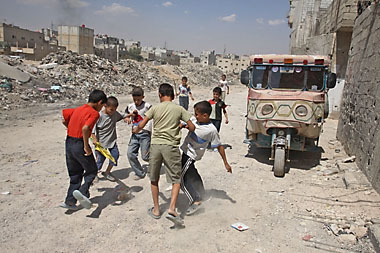The main product of the meeting is the 2010 Regional Response Plan for Iraqi Refugees (RRP), which also looked at minority groups in Iraq.
One of the Plan’s most important elements is the closure of al-Tanf camp on the Iraqi-Syrian border. The camp - in no-man’s land - is home to 1,000 Palestinian refugees from Iraq, most of whom are expected to be resettled in al-Hol camp, northeastern Syria by the end of 2010.
The Plan notes that of the 260,000 registered Iraqi refugees in Syria, less than 1,000 have sought assistance to return home under the UN Refugee Agency (UNHCR) voluntary repatriation programme. The lack of social services, employment opportunities and uncertainly surrounding planned Iraqi elections were among the reasons cited.
However, more and more refugees are reportedly returning home for short periods to collect pensions, or check on family and property.
Radhouane Nouicer, UNHCR Middle East and North Africa bureau chief, said refugee resettlement in a third country is not a solution and can only assist a small number. Nevertheless, around 20,000 Iraqi refugees in Syria and a further 10,000 in Jordan applied for third-country resettlement in 2009.
|
Photo: Stephen Starr/IRIN  |
| Over 50 NGOs, donors and agencies drafted a new plan for Iraqi refugees, which will map out support for them over 2010 |
Strategic objectives
The RRP’s strategic objectives will focus on ensuring refugees can continue to seek refuge in their host countries (in many states there is no legal framework regarding refugees, including those in the Gulf where 1,089 Iraqi individuals have been registered), and offering vocational training to those wishing to return to Iraq.
In Syria, RRP hopes to extend support for refugees in rural areas, with many parts of the country now suffering from drought.
The Plan also targets child labour by pursuing measures to get an additional 12,000 Iraqi children in Syria into school, bringing the total number to around 45,000.
Meanwhile a senior Syrian official has criticized the Iraqi government. Deputy Foreign Minister Faisal al-Miqdad said: “We will not oblige any Iraqi person to go home unless they wish to do so voluntarily, but there must be a political will in Iraq to help. The country should be welcoming to all, regardless of religion, sect or political preference.”
ss/at/cb
This article was produced by IRIN News while it was part of the United Nations Office for the Coordination of Humanitarian Affairs. Please send queries on copyright or liability to the UN. For more information: https://shop.un.org/rights-permissions




